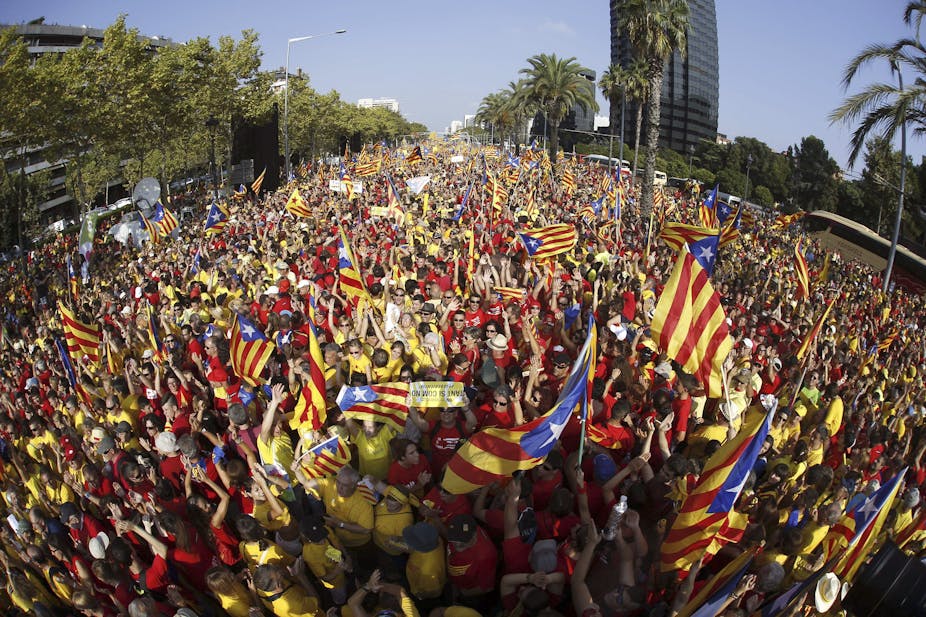On Catalonia’s national day, which they call “Diada”, hundreds of thousands of Catalans formed a huge “V” in the streets of Barcelona to demand a referendum on independence. On Thursday, no doubt emboldened to some extent by events in Scotland, this variously stood for “vote”, “victory” and “will”. In the usual crowd-counting battle, Barcelona police estimated that as many as 1.8m took part, while the Spanish central government put the figure at around half a million.
The success of the “V” confirms the remarkable capacity for pro-referendum Catalans to mobilise. They also organised a massive human chain (“the Catalan way”) last year that crossed Catalonia from north to south. Opinion polls show that some 75% of Catalans want to vote on independence, and 45% of them are in favour.

Catalan president Artur Mas (of the Convergence and Union agglomeration (CiU)) has called a referendum for November 9, but the Spanish government refuses to authorise it on the grounds that it would be illegal. Mas declared last night that the “V” was a very strong message to Madrid and to the world, and that it is time for the Spanish government to negotiate the conditions for a vote. A spokesman for the Popular Party, which runs the country, repeated the refrain that the Catalan process infringes the Spanish constitution and that, in reference to sovereignty, “a few people cannot decide on a matter that belongs to all Spaniards.”
Catalonia is not Scotland
Understandably, there have been attempts to draw parallels between the situation in Catalonia and Scotland. There were even a handful of Scottish flags in yesterday’s demonstration. But there are more differences than similarities between the two campaigns.
The most fundamental is the Spanish government’s refusal to agree on a referendum. This affects the nature of the debate: while Scots will vote Yes or No this Thursday, the debate in Catalonia is focused on whether Catalans will vote in November -– and on what they should do if they can’t.
For this reason Catalans envy the Scottish, and many of them hold David Cameron in high affection. There is some irony in seeing Catalan leftists praising Cameron, but this is also understandable: he is seen as a true democrat who, unlike Spanish prime minister Mariano Rajoy, has been reasonable and accommodating when he faced a demand for a referendum on independence.

There are other differences. In Catalonia, the independence project is not associated to a specific social model. It is not focused on “building a fairer society”. A further difference is that Scotland will obtain more powers as a result of this political process, assuming the UK leaders’ offers come to pass, while the Spanish government is not willing to negotiate any further powers for Catalonia.
This makes it hard to make any easy assumptions about the impact of the Scottish referendum in Catalonia. A Yes vote would lift the spirits of pro-referendum and pro-independence Catalans, who will see Scotland as a precedent and as a reference. But the overall effect on public opinion should not be exaggerated.
Where do we go from here?
The Catalan parliament will pass a law of non-binding popular consultations on September 19, which by no coincidence is the day after the Scottish referendum. Mas will then use this legal framework to issue a decree on the 22nd or the 23rd calling for the November referendum. The Spanish government will immediately challenge the decree –- and perhaps the law itself too –- in the constitutional court, thus paralysing them. Nobody expects a decision from the court soon, but neither do they hold out any eventual hope: the court already rejected the Catalan parliament’s declaration of sovereignty in March.
Three main scenarios are foreseeable. The first and perhaps most plausible is that Mas will call for a plebiscitary election that could be held in 2015. This would be instead of the referendum. The parties would unambiguously campaign for or against independence and would seek to obtain a majority in the parliament. It could include a commitment to negotiate, or even unilaterally declare independence, in the event of a Yes vote. However this is uncertain for many reasons, not least that CiU would be shooting themselves in the foot: all opinion polls show that the centre-left, pro-independence Republican Left of Catalonia (ERC) party would win the election comfortably.
The second scenario is that the Catalan government will go ahead anyway and will bring the ballot boxes out on the streets on November 9. In doing so they would still be holding a vote, but it would not be legally binding and its political relevance would be limited. The smaller of the two parties that comprise CiU in the Catalan government, Democratic Union of Catalonia (UDC), has also made clear that they do not support going beyond what is legally permissible.
The third and final scenario is that Mas will simply not react to the Spanish government challenging the decree in the constitutional court. CiU, which currently holds a minority government, would then lose the parliamentary support of ERC. Instead it would have to rely on the Catalan Socialist Party (PSC), which does not support independence and only supports a referendum that has been agreed with Madrid. This scenario is unlikely as Mas is aware that many Catalans would think he had betrayed them. While he and Catalan independence supporters consider the best way forward, you can be sure that this corner of western Europe will be watching events in Scotland next week particularly closely.

